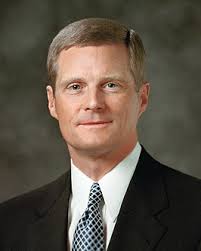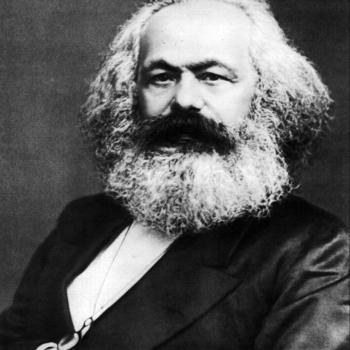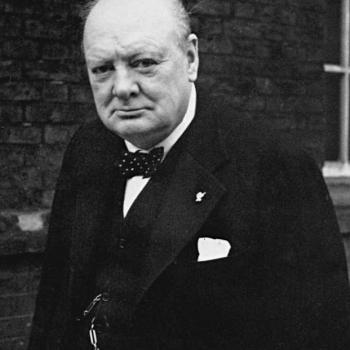All of you are probably aware of Elder Bednar’s very striking exhortation at BYU’s recent Education Week to use new technologies in sharing the gospel:
My beloved brothers and sisters, what has been accomplished thus far in this dispensation communicating gospel messages through social media channels is a good beginning—but only a small trickle. I now extend to you the invitation to help transform the trickle into a flood. Beginning at this place on this day, I exhort you to sweep the earth with messages filled with righteousness and truth—messages that are authentic, edifying, and praiseworthy—and literally to sweep the earth as with a flood.
Of course this attention to technological opportunities is not new; Elder Ballard and others have for years been encouraging us to enter wisely and authentically into the conversations made possible by the new media. But Elder Bednar’s clarion call to flood the earth with good news, accompanied as it is by various examples of new initiatives in communication the Church’s message, should get the attention of those of us particularly who are in one way or another “in the business” of sharing information and ideas as teachers, writers, publicists, etc. Although Elder Bednar’s focus was most specifically on the “social media,” his message is clearly relevant for those of us who publish online material (articles and blog posts) that are generally shared through media such as Facebook and Twitter.
There is obviously a great deal of online activity going on already on the part of LDS scholars and intellectuals. There are dozens of blogs devoted to Mormon concerns, and they offer many genuinely faithful and thoughtful discussions. But the center of gravity on most sites (there are just a few blessed exceptions) tends inevitably to drift in a direction that favors discussion of Church leaders’ fallibility, almost always based upon ideological commitments that conflict with teachings on morality and on the family that the leaders we sustain have re-affirmed with absolute clarity in recent years. “Equality” and “Freedom,” (and cognates such as “diversity” and “inclusiveness”), as the overwhelming majority of secular intellectuals and the media generally now understand these terms, provide the unquestioned core content of a new understanding of righteousness. Equality here does not mean intrinsic spiritual worth, but as sameness in all things (or at least in ever more things); meanwhile, freedom does not refer to moral agency but to the individual’s ongoing emancipation from any authoritative morality (especially in matters defined by sexual expression or “identity”). The dominant orientation of the “bloggernacle” thus assumes the moral superiority of intellectuals to Church authorities. To be sure, even on the more “dissident” blogs there are some admirable exceptions: some authors show moderation in demanding change, and counsel patience with our well-meaning leaders. But it is rare indeed to find the new understandings of equality and freedom directly challenged, and those who dare to do so are likely to face some pretty strident opposition.
Our Church leaders have not shrunk from addressing the ideological challenge of radical equality and relativistic freedom. While scrupulously observing neutrality in electoral politics, our General Authorities have recently addressed some of the deepest political, moral and ideological issues that divide Americans today in the clearest possible terms. Let me cite a few examples:
There is this bracing statement from Elder Oaks:
“I believe the diminished value being attached to religious freedom stems from the ascendency of moral relativism. …More and more of our citizens support the idea that all authority and all rules of behavior are man-made and can be accepted or rejected as one chooses. Each person is free to decide for himself or herself what is right and wrong. Our children face the challenge of living in an increasingly godless and amoral society.”
And this from Elder Bednar, following a crystal-clear affirmation of LDS doctrine on sexual morality:
“The doctrine I have described will seem to be archaic and outdated to many people in a world that increasingly mocks the sanctity of procreation and minimizes the worth of human life. But the Lord’s truth is not altered by fads, popularity, or public opinion polls.”
And of course there is the Family Proclamation, which would seem to provide as clear an alternative to the ideology of sameness and extreme freedom as can be imagined. (But then, we learn from the leading LDS blogs, the Family Proclamation is not scripture and thus we can reasonably hope that it will soon be superseded by a viewpoint friendlier to the only true ideals of freedom and equality.)
Thus there is no lack of clear Apostolic guidance relating to ideological threats to core moral principles. But there are few LDS scholars and thinkers who raise their voices in public discussions to expound and defend these authoritative statements. It is worth asking why this is. I believe the ideology of extreme equality/freedom occupies such a position of moral authority in the academy and the intellectual world that this ideology can be questioned only a great risk. Critical engagement with such ideological assumptions is a kind of third rail that must not be touched even by organizations that are explicitly and sincerely committed to defending the faith; and anyone who dares question the dominant ideology is accused of being intolerant, insensitive, and even hateful towards those who are hoping to find comfort in the subversion of basic moral principles. Candid and genuine discussion is thus suppressed, and those who flout the dominant view risk almost certain opprobrium and very possibly real professional harmas well. Thus the pursuit of truth in a vitally important area risks being held hostage indefinitely by the sanctioned custodians of the feelings of authorized “victims.”
To acquiesce in this state of affairs is to be complicit in the marginalization of the truth among a very significant audience of young and intellectually alert LDS. But if the truth matters to people’s lives, then this acquiescence is itself insensitive and uncaring regarding the spiritual needs of our brothers and sisters. The suppression of the truth in fact has victims. One kind of victim is the member who is abetted in abandoning good moral principles by the distorting ideology of too many LDS “intellectuals.” Another kind of victim might be described as those members who constitute the Church’s “base.” I see and hear of evidence in many wards that this base of faithful members risks being demoralized; ordinary “active” members who are alert to intellectual discussions increasingly feel abandoned in a world given over to dogmatic relativism, a world in which “compassion” for those who are “different” has not only undermined moral conviction but sucked all the air out of open discussion. It is understandable that many members, including promising but vulnerable young adults, feel that they must choose between being intelligent and being faithful.
Faithful LDS scholars/intellectuals are understandably very attentive to the vocal dissident or self-described marginal member; we take great pains to be “inclusive” and to “enlarge our tent” in order to include as many as possible. But in fact we are not enlarging. We are moving the tent stakes of intellectual respectability way over in one direction in order to try to include those inclined to abandon core moral teachings; but this is possible only by pulling up the stakes on the other side and removing the principles that shelter moral convictions, thus leaving many faithful and traditional members exposed to ideological storms without the shelter of the arguments and of the institutional and intellectual prestige that we might have provided.
This purpose of this missive is to appeal to you to contribute your talents and to be anxiously engaged in the good cause of defending core teachings of the Church concerning morality and the family, even though, indeed precisely because, these teachings are incompatible, not with critical thinking, but with an ideology that is increasingly ascendant among intellectuals, media elites and academics.
Let me now briefly consider some objections or reservations that I know good and faithful scholar and writers have regarding the kind of intellectual enterprise I am soliciting. This enterprise might be called “moral apologetics” or perhaps “anti-ideological apologetics.”
First, there is an understandable reluctance to mix religion and politics. And I agree that to tie the Church or its teachings to any narrowly partisan agenda or to any actual political party would be a great mistake; the gospel is too important to be compromised by alignment with any merely political and necessarily partial cause. But we cannot hide from the fact that there are strong ideological and political forces that are taking direct aim at fundamental principles concerning morality and the family. To resist these forces is to act in a way that is politically significant, whether we like it or not.
I should add here that these forces will not just go away, and they will not leave us alone. It is comforting to think that we can simply agree to disagree with elements of our society that wish, for example, to redefine the “family” out of existence. But we will not be able to avoid the effects of the dominance of the new ideology. We see them already in the way this ideology tends to undermine the moral categories even of active Church members whose roots are not deep and strong enough. But even those whose beliefs are not undermined from within will find their religious practice constrained more and more by the dominant ideology. There is no way that religious freedom can be safe in a society in which traditional believers are regarded as “bigots.”
Our religious beliefs thus have political implications, whether we wish it to be so or not. Still, we must be careful not to identify the Church’s teaching or its interest in sharing the gospel and saving souls with any merely partisan agenda. Obviously there is good and bad, there is truth and there is error, to be found in both parties. The church and we who sustain it and want to contribute to its efforts cannot avoid opposing certain political trends, but we must be ever alert to the danger of identifying our religious purposes with any merely political orientation.
Others may wish to support Church teachings concerning morality and the family but would rather do so privately, even silently, leaving such controversial matters to Church authorities, conceding perhaps that reason has little to say in this area. This is a question that would require much further discussion. For now I will only say that I think it is a big mistake to concede the title of rationality to the proponents of radical equality and freedom, and thus implicitly abandon core moral principles and teachings concerning the family to the realm of some blind obedience. If Truth is one, then reason must have some access to the goods defined by revelation. And, in fact, the pretensions of “rationality” advanced by the ideology I have described are very thin and fragile at best. These pretensions are maintained largely by a rather thoughtless identification of reason with boundless sameness and liberation, often accompanied by a seductive by intellectually irresponsible invitation to join “the right side of History” an This appeal passes itself off as “rational” only by assuming that traditional family structures and moral restraints are derived from religious superstitions that have no basis in human nature. This assumption is eminently contestable, and I think we ought to contest it.
Careful, critical thinking thus has a role to play in explaining and defending the Church’s moral position, just as it does in the area of Church history and scripture. In fact, reason’s role in countering the powerful ideology of radical equality/freedom may be of the most urgent importance, since it is in this area that many young and intellectually ambitious LDS are facing challenges to their faith. A young professional or graduate student who dares share his belief in Gold Plates or in a corporeal God may face only mild ridicule or bemusement. However, if he or she should betray the slightest doubt concerning the implications of the new equality/freedom, he is very possibly putting his educational and professional career at risk. Naturally this immense pressure, from polite society at large as well as very immediate peers and mentors, tends powerfully to shape the sensibilities of those who suffer under it. It would be a great pity – and a great failure of responsibility – if faithful LDS scholars and thinkers continued to leave such members (and prospective members) without the reasons for their faith (or perhaps especially the reasons to doubt the dominant secular faith) that we might help to provide them.
There remains briefly to discuss one further and very significant challenge involved in the critically important enterprise of moral and anti-ideological apologetics. It is well represented by these remarks from Elder Bednar’s recent talk:
Second, we and our messages should seek to edify and uplift rather than to argue, debate, condemn, or belittle. As Paul counseled the Ephesians, “Let no corrupt communication proceed out of your mouth, but that which is good to the use of edifying, that it may minister grace unto the hearers” (Ephesians 4:29).
Brothers and sisters, share the gospel with genuine love and concern for others. Be courageous and bold but not overbearing in sustaining and defending our beliefs, and avoid contention. As disciples our purpose should be to use social media channels as a means of projecting the light and truth of the restored gospel of Jesus Christ into a world that increasingly is dark and confused.
The stakes involved in contemporary debates on morality and the family are very high, and the risk of reasonable discussion and argument being overwhelmed by fervent emotions is accordingly great. Bringing edification while questioning passionately held ideological views is an intellectual and rhetorical challenge of the highest order; to generate more light than heat is very difficult in these circumstances. I am very aware, for my part, of often falling short in this area; my professional habit as a discussant of philosophical texts is to state confidently an argument I think is inherently sound and to critique clearly, even sharply, where I find reason wanting. Often this has led me to fail to pay due attention to the assumptions that must be unpacked in order to make an argument plausible and appealing to readers coming from other contexts. To be appropriately “courageous and bold” without being contentious or overbearing will require of us rare qualities of intellect and of character, qualities that I, for my part, am still working to cultivate.
The key, as always, must be in Christ- like love, in true Charity grounded in Christ’s example and in the conversion made possible by his atoning sacrifice. Readiness to repent and to forgive must accompany all our efforts to see clearly and to reason cogently and courageously. We must open ourselves to the genuine concerns of others, even when we are inclined to think they are mistaken, and constantly strive to rid ourselves of self-serving motives such as intellectual vanity as we seek to articulate a perspective in which true fellowship in the common pursuit of life-giving truth can prosper. This letter is addressed to fellow scholars and thinkers with whom it would be a blessing to share this great moral, spiritual and intellectual challenge.












